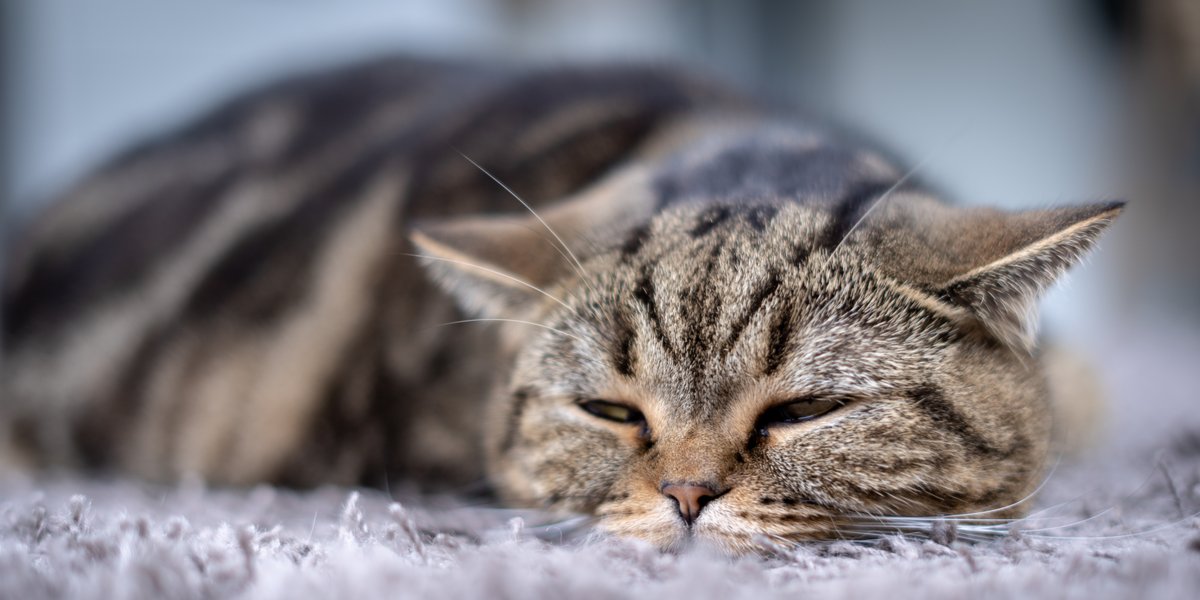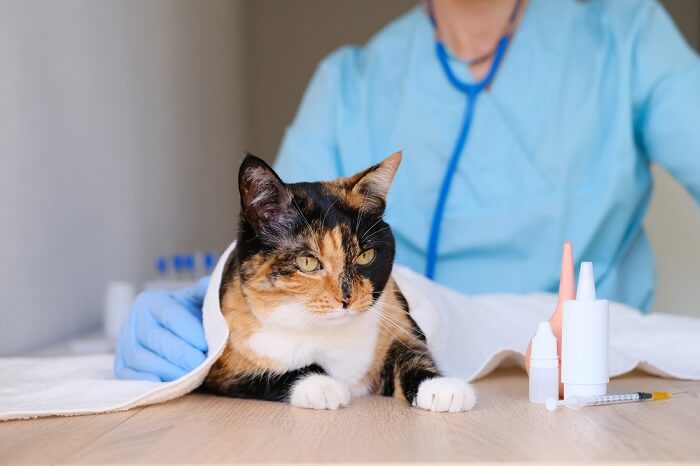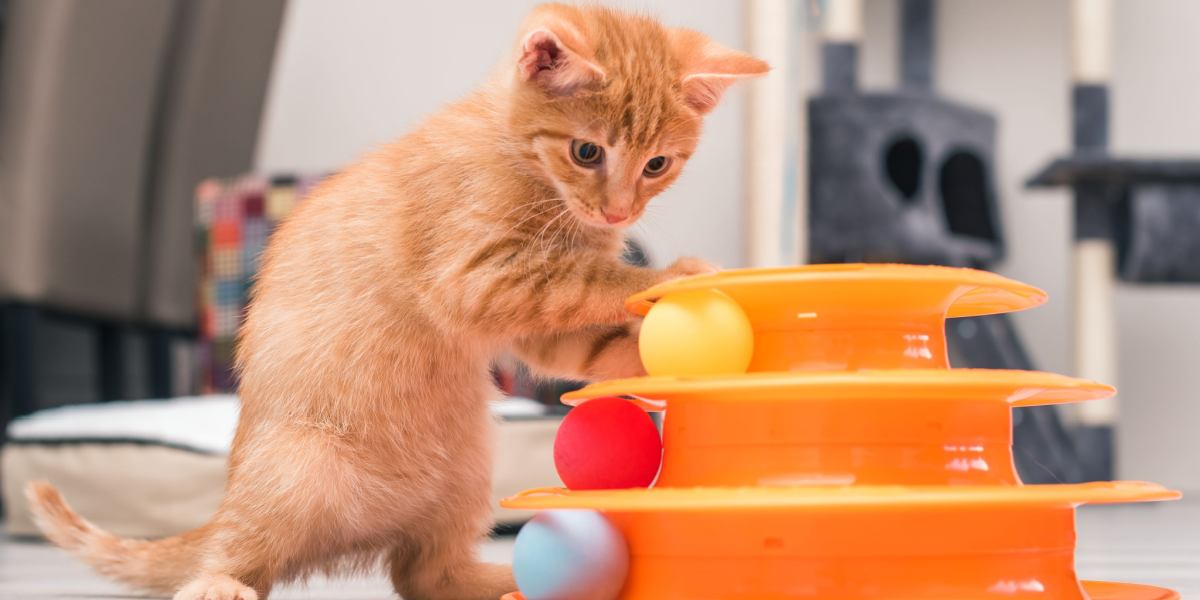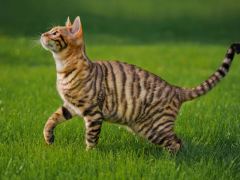
Yes, it’s true! Just like dogs and people, cats can develop Alzheimer’s disease (a form of dementia.) Technically, the condition is referred to as cognitive disorder or cognitive dysfunction, but clinically, it’s the same problem seen in people.
Typically, Alzheimer’s in cats affects felines who are middle-aged and older (often referred to as senior or geriatric,) and it’s unlikely to see the condition in cats younger than 10-12 years of age.
What Is Cognitive Disorder?
Cognitive disorder is a condition where the cognitive centers of the brain reduce normal functioning as the result of the accumulation of beta-amyloid plaques. The exact cause is unknown but certainly, chronic inflammation plays a role in the development of this condition.
Symptoms of Alzheimer’s in Cats
There are various signs of cognitive disorder. Not every affected cat will display all of these signs, but any of the signs seen in an older cat could indicate cognitive impairment.
Additionally, because these signs may be associated with other, more serious conditions, you should see our veterinarian if your cat exhibits any of these signs.
Signs and symptoms that May be seen include:
- Disorientation
- Lack of interest in playing with the owner or other pets
- Excessive sleeping (this may be normal in older cats or those in whom human interaction is limited)
- Altered sleep-wake cycles
- Staring blankly into space or at walls, as well as getting stuck in a corner, room, or closet and not being able to find its way out
- Urinating/defecating outside the litter box (this can be a sign of GI, urinary or musculoskeletal disease as well)
- Episodes of loud vocalizing, often at night
How Is Alzheimer’s in Cats Diagnosed?
As in people and dogs, there is no specific test for cognitive disorder. Rather, it is considered a rule-out diagnosis. This means that testing must be done to rule-out other diseases that can develop in older cats and which may mimic cognitive disorder.
Also, because cats with cognitive disorder are older and likely to have some medical problems, it’s important to know if a cat that is ultimately diagnosed with cognitive disorder also has any other underlying, especially asymptomatic, problems that must also be treated along with the cognitive disorder.
In my holistic/functional medicine practice, the following tests are done to help establish a diagnosis of cognitive disorder and also determine if any other underlying issues are present which require attention.
Thorough History and Examination

The examination may reveal a cat which seems “lost” or “senile”
The first clue that tips me off to a possible diagnosis of cognitive disorder is questioning the owner and examining the cat. The owner frequently mentions several or many of the clinical signs mentioned above.
The examination may reveal a cat which seems “lost” or “senile” by the way it interacts with me and moves about the exam room. Sometimes cats with cognitive disorder appear fairly normal during the visit, especially early in the course of the disease.
If the owner mentions that clinical signs are commonly noticed at home but not present during the examination, I’ll ask the owner to record the cat and send the recording to me for review.
EKG
Older cats may have heart disease, and in those cases in which heart disease is not detected during the physical, the EKG may provide further evidence of suspected heart disease.
Blood and Urine Testing
This testing is critical for all cats and something I do at least annually and preferably twice annually in my patients.
Blood and urine testing will allow for conditions that may present with cognitive signs including diabetes, liver disease, and hyperthyroidism.
These conditions must be addressed. Once corrected, signs of cognitive disorder will resolve if one of these (or other) medical conditions were the cause of the symptoms which resembled cognitive disorder.
How is Alzheimer’s in Cats Treated??
A number of natural therapies have been recommended for treating cognitive disorder in pets, including Omega-3 fatty acids (fish oil), antioxidants (vitamin C and E, resveratrol), herbs (such as ginkgo biloba) and nutritional supplements (including SAMe, phosphatidylserine and phosphatidylcholine).
Since it is beyond the scope of this article to have an in-depth discussion of each therapy, I will focus on two that have been well researched.
SAMe (Novifit, Virbac)

It has been suggested that aging people and pets begin to lose cholinergic receptors and have decreased levels of acetylcholine.
SAMe is formed in the body and is not supplied in the diet. SAMe functions as a methyl donor in the formation of a variety of compounds (neurotransmitters, proteins, membrane phospholipids, nucleic acids, choline, etc.) and increases levels of serotonin and dopamine metabolites, improves neuron membrane fluidity, and enhances binding of neurotransmitters to receptors.
Levels of SAMe decline sharply after birth and continue to decline as part of the aging process; decreased SAMe may contribute to cognitive decline in cats.
Sixty days of use of Novifit should be tried to assess effectiveness.
Phosphatidylcholine (Cholodin, MVP Laboratories)
Choline is a component of several major phospholipids (including phosphatidylcholine and sphingomyelin) that are critical for normal cell membrane structure and function.
The body uses choline for many reasons including the production of the nerve transmitter acetylcholine. Supplemental choline may increase the production of acetylcholine in older pets and reverse clinical signs of cognitive disorder.
Choline supplementation is very safe.
It has been suggested that aging people and pets begin to lose cholinergic receptors and have decreased levels of acetylcholine.
Since oral choline administration increases plasma choline levels, and since brain levels of acetylcholine increase as plasma choline levels increase, administering choline may improve neurological disorders that result from decreased acetylcholine.
Choline, specifically the patented product Cholodin (MVP Laboratories), has been shown in studies done in my hospital to reverse clinical signs of cognitive disorder in both dogs and cats.
At the conclusion of the study (two months following treatment), owners were asked to evaluate improvement in clinical signs: 82% of dogs showed improvement as did 77% of cats.
In my practice, because cognitive disorder tends to be diagnosed earlier than those in the study I conducted of pets in the North Texas area, my response is over 95% improvement.
Additionally, due to our preventive wellness programs, we tend not to see as many chronic diseases like cognitive disorder as frequently as seen in the general population of pets who do not frequent holistic doctors.
Anipryl (selegiline)
Anipryl (selegiline) is a pharmaceutical (drug) therapy that is indicated for the control of signs associated with canine Cognitive Dysfunction Syndrome (CDS) and control of uncomplicated pituitary-dependent hyperadrenocorticism (PDH, Cushing’s disease.)
Anipryl is a selective monoamine oxidase -B inhibitor. This may enhance catecholamine neuron activity and increases dopamine levels in dogs, thus improving cognitive signs. It is not approved for use in cats but may be helpful if natural therapies do not achieve the desired results.
I have never had to use it in my practice.
Mental Stimulation

Cognitive disorder is the most common chronic, progressive neurological disorder of older cats.
Finally, don’t forget the importance of ongoing interaction and mental stimulation for your cat, including maintaining a stable routine and regular play time.
Regardless of the treatment chosen, early diagnosis and intervention is key to minimizing the incidence of cognitive disorder in pets. Regular “senior pet” checkups that include a full physical examination, blood profile, urinalysis, and microscopic fecal analysis, ideally every six to 12 months for pets five years of age and older, will facilitate communication and allow for early diagnosis.
In my practice, for treatment I tend to prefer choline supplementation plus fatty acids and antioxidants; other herbs and/or homeopathics may also be tried. Because each cat is an individual, so too the treatment needs to be tailored to the needs of each individual cat. Additionally, feeding a healthy diet and minimizing toxins such as excessive vaccination is also important.
Conclusion
Cognitive disorder is the most common chronic, progressive neurological disorder of older cats. Prevention may be possible by reducing inflammation and providing supplementation with choline. Treatment occurs after ruling out other causes and involves supplementation with choline, herbs, and homeopathics; treatment varies with each individual cat.
Frequently Asked Questions
What are the signs of Alzheimer's in cats?
Signs include forgetfulness, vocalizations, disturbances in sleeping cycles, and staring into space.
What does cat dementia look like?
Owners often report that the cat seems spacey or distant, and at times unaware of its surroundings. Sometimes the complaint is more vague such as the cat just seems different or isn’t itself.
Why does my elderly cat yowl?
There are many reasons for this including normal behavior, attention seeking, pain, discomfort, or cognitive disorder.
Do older cats get confused?
Yes and this is a classic sign of cognitive disorder, especially in the more advanced stages. Confusion can occur with any problem that interferes with normal cognitive brain function including cognitive disorder.








Hello!
I have four older cats, and one in particular will start to yell if we’ve left the room while she sleeps. She will just yell, until we call for her or go get her. She’s is a very goofy cat, in general, and is grieving two other of our cats who passed away this year (thyroid disease.) They are not typical; they were a family of Feral cats, that we adopted (mom, dad and three kittens) and then Baby (the odd one our, who hollers, and wants to be held and carried everywhere) that my dog Pumpkin found and brought home one winter.
I live in Arlington, WA and was wondering if you knew of any Veterinarians in my area who follow your approach?
Thank you,
Kimberly
Hey Kimberly! I apologize for the late reply. It’s been a while since we’ve done work with Dr. Messonnier, and I’m not sure he’ll see this message. However, it sounds like your cat is stressed by the loss of her relatives and has an anxious personality in general. I would do a search for Fear-Free certified veterinarians, especially those who specialize in cats. A vet who understands, not only the physical, but the emotional side of feline wellbeing, is what you need.
Thank you, so very much. I really appreciate it. I’ll look for a free-fear vet in the area!